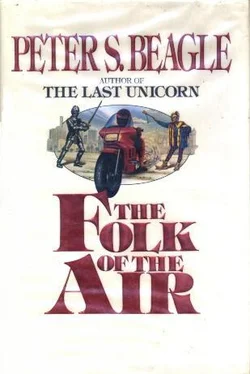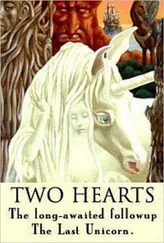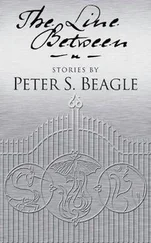For herself, Julie chose a long, simple gown, deep green and close-fitting; and over it, she wore a garment like a full-length apron, almost the same clear, pale amber as her skin. The apron had no sides, being joined only at the hips and shoulders. Julie smoothed her hands down the dark ellipses and told Farrell, “They used to call these the Gates of Hell.”
“When did they stop?” he asked, and she giggled.
“This is prim, this is inhibited. High medieval clothing is the most sensual stuff anybody ever wore. I made a kirtle for the Lady Criseyde once—” She stopped, and then asked him, “Do you wonder where I’m taking you? What are you thinking?”
“I still think it’s a costume party. With any luck, maybe a costume orgy.”
Julie did not laugh. She said very quietly, “That happened once. You wouldn’t have liked it.”
A short green cloak for him, a longer gray mantle over her shoulders, the hood shrouding her loose hair, and she was saying in the milky night, “You’ll have to drive the bike. I’ll tell you how to go.”
Farrell blinked at the BSA lowering at the curb like a cumulonimbus. Julie put her key ring into his hand. “I can’t drive in this outfit, and I feel like taking the bike. You always like to drive my machines.”
“Not in the Macy’s Parade,” he grumbled. “It’s bad luck to humiliate a BSA.” But he was already unlocking the front fork, greedily but with a certain proper deference. He thought of Julie’s motorcycles as her familiar demons, a cross between hippogriffs and pit bulls.
Julie lived three blocks off Parnell, almost on the invisible line dividing student Avicenna from the rest of the town. She rode sidesaddle, one arm lightly holding Farrell’s waist as he guided the BSA gingerly up to Parnell. “Like London,” she said, “when we used to sneak out at night so you could practice. Because you didn’t have a permit.”
“And you didn’t have title to the bike. I was so impressed with you, stealing bikes and all like that. My outlaw.”
“Actually, I was just late getting the papers. But the other was more fun for you.” She directed him north, toward the university.
Every record store was open late, and all car radios and portable tape decks were at full volume, speakers bellowing back and forth like rutting alligators. Farrell eased along Parnell, passing like a diver through the shifting currents, temperatures, and textures of sound. The street simmered and banged in its own lemon-butter light—on this Saturday night at least a little like the old times, when every corner had been an Arab marketplace and all doorways were inhabited by lovers, thieves, and businessmen, by troubadours and children with cellophane eyes and faces made of hard candy. Julie leaned against Farrell’s back and chanted softly in his ear:
“ The hag is astride ,
This night for to ride—
The devil and she together …“
An improbably tall, impossibly thin black man was standing in the middle of the street, flouncing gently as he considered the drivers who passed him by, waving them along with an outsized, flowing blissfulness. The BSA was moving almost at a walk as it reached him, and he had leisure to study Farrell and Julie’s faces and clothing, to pat their heads solemnly, and to bend down to them. His face was concave and burnished, smooth as an old wooden spoon. They felt the light, lost, mocking touch of his voice: “Remember me to the girl. Oh, tell Aiffe of Scotland to remember Prester John.”
Behind Farrell, Julie said sharply, “Turn right here.” Farrell nodded to the black man and cut past a movie theater whose marquee advertised a Rhonda Fleming retrospective, gunning the motorcycle uphill into darkness again.
“That’s more like it,” he said happily over his shoulder. “Prester John of Africa and India, the one whose cook was a king and whose chamberlain was an archbishop. That’s where the Fountain of Youth was, in Prester John’s country.” Julie said nothing, and he went on thoughtfully. “Aiffe of Scotland. I almost know her, too—sounds like someone in an old ballad.” What the name actually brought back to him was the warm, prickly sourness of the swimming pool and Crof Grant nattering on about a girl he was afraid of. He said, “This town always did have the most erudite loonies.”
“He’s not a loony. Don’t you call him that.” Julie’s voice was hard and low.
“I’m sorry,” Farrell said. “I didn’t know you were friends. I’m sorry, Jewel.”
“We’re friends. His name is Rodney Micah Willows.”
Farrell opened the BSA up a bit, heading into the hills toward Barton Park. Julie’s hood blew back, and her hair snapped along his cheek. She tucked herself closer against him, murmuring the witch-poem once more:
“ The storm will arise
And trouble the skies ,
This night; and, more the wonder ,
The ghost from the tomb
Affrighted shall come ,
Called out by the clap of the thunder .“
They entered the park at the south end, on the opposite side from the zoo. The main road spiraled upward around a shaggy, bulging foothill, widening occasionally into shaved areas where redwood tables, benches, washrooms, and see-saws flourished under the redwoods. Beneath a tarnished silver sky, the picnic structures all stood up like great slabs of granite, appointed to guide an extinct mathematics and uphold a faith, with thin, shallow rills to lead the blood away. California Stonehenge. They’ll think we used the whole park for predicting earthquakes .
Smaller paths ran away from the camping areas down to baseball fields and cinder tracks or up and in through groves silted ankle-deep with redwood mold, smelling like cool, powdered armpits. Julie directed Farrell onto one of the steep grades, and he followed it slowly down a black arcade of trees with a mandarin moon brooding in their top branches, until he came out suddenly into a meadow and saw lights jigging far ahead.
“We’ll walk from here,” Julie said as the cars and motorcycles began to drift into shape on both sides of the path. Farrell cut the engine and heard owls. He also heard Gervaise‘ basse-dance La Volunté being played by crumhorns and a rebec. The tune twinkled across the meadow, cold as coins, tiny and shining and sharp as new nails.
“Be damned,” he said softly. He parked the BSA near a Norton and told them to play nicely. Julie and he walked on toward the lights. She linked her arm in his, letting her fingers lie along the inside of his wrist.
“Pick a name,” she said. La Volunté ended to the sound of laughter. There was a dark tent, floating at its base like a distant mountain.
“Lester Young. No, Tom a’Bedlam.” She stopped walking and stared. “You know. With a host of furious fancies, whereof I am commander —”
“Be serious,” she said with surprising fierceness. “Names mean something here, Joe. Pick a good name, quickly, I’ll tell you why later.”
But the music had made him pleasantly frisky, rocking him gently in the sweet air. He said, “All right, Solomon Daisy. Malagigi the Dwarf Enchanter. Splendid name.” The consort began to play another Gervaise piece, a pavane, giving it the slow, gracious lilt that makes a pavane something more than procession. “How about John Amend-All? Big Jon and Sparkie? You could be Sparkie.” The music sounded no closer as they approached the pavilion in the meadow. An owl was overhead, moving like a great ray flying in the deep sea. Farrell put his arm around Julie’s shoulders and said, “Sorry. You choose a good name for me, please.”
Before she could answer him, a plumed shadow stood up before them, as sudden as the owl. “Who goes?” It was a low voice, hardly louder than the little scream of steel on iron that accompanied it.
Читать дальше












